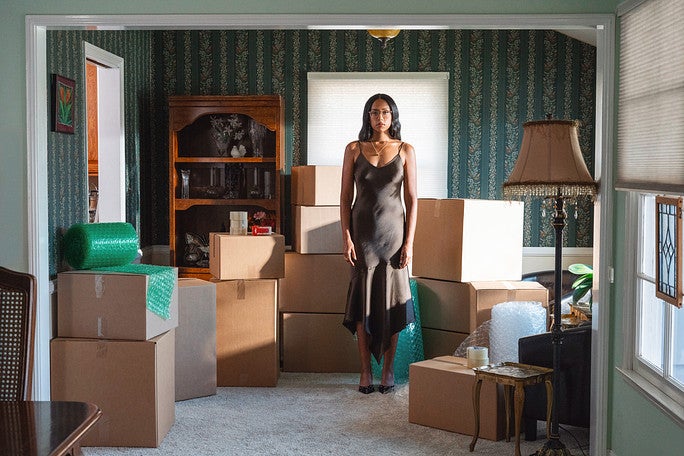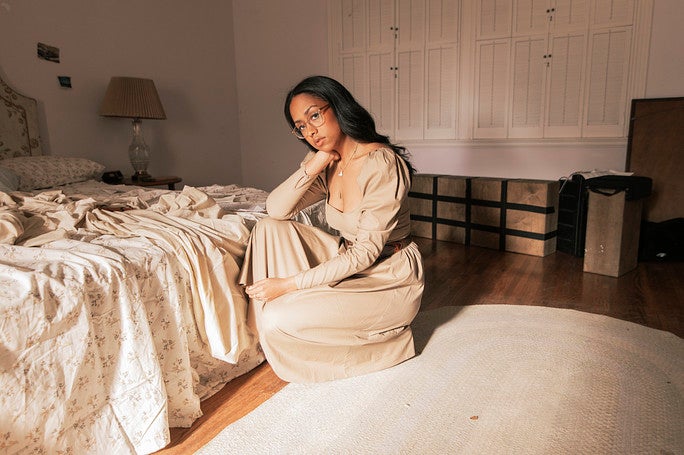When 27-year-old folk singer Jensen McRae received an Instagram message from Justin Bieber praising her viral breakup song “Massachusetts”, she thought it was a one-off. But then came an invite to an impromptu jamming session at his home studio with eight other musicians. By the end of the day, they had laid down vocals for a dozen songs together. “He was incredibly encouraging in the room. Every time I would start singing something, he would be motioning for me to keep going,” she tells me down the phone from an Amsterdam hotel. “He just called me the other day to tell me that he is so grateful to know me, like saying, ‘I’m so proud of you.’”
It’s no surprise that Bieber is just one of the A-list musicians clamouring to work with McRae following the release of her bewitching double breakup album I Don’t Know How But They Found Me!, which she is touring in the UK and Ireland from next week. The album, a level up from her pop-inflected 2022 debut, Are You Happy Now?, sounds like Tracy Chapman is crooning along to a gut-wrenching Phoebe Bridgers track in her deep, buttery voice. And you can’t miss the articulate Taylor Swift-inspired lyricism, either. We know that the male subject of “I Can Change Him” wears cheap cologne and hand-rolls his cigarettes.
In the morning-after anthem “Novelty”, she imagines her love interest to have “navy bed sheets” at his bachelor pad in Shoreditch. On the nostalgic “Savannah”, about the symbolism of the Georgian city after her ex didn’t follow through on a promised trip there, she chants in her honeyed voice: “There is a bar you’re not allowed in on Bellevue/ A bloody-faced comet, you were a time bomb.” These songs often find McRae alone with her thoughts, appealing to God in her darkest moments or the company of disappointing and sometimes cruel men.
The album’s narrative traces the breakdown of two consecutive relationships across two years, and the emotional reshuffling that was required afterward. “The first relationship was one that I left, and it was because I felt unsafe,” says McRae. “And the second relationship ended not on my terms, and I felt abandoned. It was two different types of trauma to be dealing with.” Learning to function independently again, then, was difficult. “Being in relationships for two years without a break had made me really lose sight of who I was,” she says. “I had to really learn how to be by myself again and not have the crunch of whenever I’m sad or anxious or insecure, to call some man and be like, ‘Fix it for me’. I had to do it on my own.” The album’s cover represents that shift: McRae is pictured standing alone in a living room, clutching a roll of bubble wrap as she boxes up her life and moves back home.
McRae is speaking to me from her hotel room after a long journey from Berlin, where she performed last night. Her camera is off; she declines when I ask her to turn it on, presumably because she’s resting. A selfie icon glows on my screen, showing McRae pouting in her signature transparent-framed glasses, with her long black hair falling by her shoulders. She’s no stranger to touring – she’s supported “Stick Season” singer Noah Kahan and the band MUNA in the past – but the physical demands of that peripatetic lifestyle are difficult to maintain.
During the pandemic, McRae was diagnosed with a thyroid condition and chronic hives, which means that she eats a restrictive diet, must get lots of sleep and wear masks when travelling. With that in mind, she provides fans with face masks at her gigs. At her Berlin gig last week, she was heartened to see the majority of the crowd wearing them.
She hopes that this ethos opens up the concert environment to people who may typically avoid large gatherings for health reasons. “When people wear masks, it just makes it so much safer for them to be able to be in that sort of community, regardless of their health status and their physical ability status,” she says. “It makes me really happy when my fans listen to my suggestions and recommendations, and that they know that they can go to a concert, and leave knowing they didn’t make anyone else sick. And they also did not get sick.” Most of us wouldn’t have seen a crowd completely masked up in several years, but McRae finds that her crowds are very supportive. “I hope that it makes fans feel a little bit less anxious and a little more protected and cared for. I’m happy to lead the charge.”

McRae, who is of Black and Jewish descent, was born in Santa Monica, California, where she and her three brothers were enrolled in piano lessons. Their parents listened to all the great singer-songwriters: Alicia Keys, Carole King, James Taylor and Stevie Wonder. McRae remembers writing a song on the piano, aged eight, and performing it to her class. “My belief in myself far outstripped my actual talent for decades,” she laughs. “I’ve known I’ve wanted to do this since I had conscious thought.”
Having friends in high places, then, has proved extremely fruitful in transforming dreams into reality. She recently posted a selfie with Bieber on Instagram, and John Legend commented: “Saw you in the NYT! Exciting!” She has had a studio session with Legend, and also met one of her heroes, Bon Iver, both of whom she says have treated her like a “complete equal”.
Enjoy unlimited access to 100 million ad-free songs and podcasts with Amazon Music
Sign up now for a 30-day free trial. Terms apply.
Try for free
ADVERTISEMENT. If you sign up to this service we will earn commission. This revenue helps to fund journalism across The Independent.
Enjoy unlimited access to 100 million ad-free songs and podcasts with Amazon Music
Sign up now for a 30-day free trial. Terms apply.
Try for free
ADVERTISEMENT. If you sign up to this service we will earn commission. This revenue helps to fund journalism across The Independent.
Bieber is consistently – but somewhat sporadically – showing his support for McRae’s work. “He’ll just disappear for weeks or months at a time, and I won’t hear from him,” she says. “He won’t answer my texts, and then he’ll just suddenly text or call and be like, ‘What you’re doing is amazing.’ He’s like another big brother, randomly reminding people he’s picked to guide along the way that they’re doing a great job. I just hope that the people in his life are giving him the same kind of support that he’s always giving back out.”

McRae’s career is incredibly well-timed, then. Right now, the folk genre is experiencing constant re-revivals, and McRae attributes that to listeners’ desire for human connection in a disparate world. “I think there’s a craving among a lot of young people for things that feel particularly human,” she says. “And I think folk is a form of oral storytelling, and is one of the most human practices that we have. Because there’s so much of life is mediated by technology now, and there’s all of this pressure for generative AI and ChatGPT, and all of these things that are minimising our connection with other human beings.” Young people, she says, are desperately trying to avoid the “flattening of human connection”.
McRae believes that the genre is now, more than ever, welcoming a diverse set of musicians. “We’re seeing a lot more queer people, a lot more women, a lot more people of colour, a lot more disabled people making this style of music,” she says. “Because folk music at the end of the day is about telling outsider stories. And there’s no one more outsider than people who are not straight white men.”
And that’s only had a knock-on effect on the potential new folk fans, too. “Audiences are finding artists who look like them and sound like them,” she says earnestly. “They are feeling seen in a way they haven’t been seen before.”
Jensen McRae’s Praying for Your Downfall tour arrives in Dublin on 18 June



